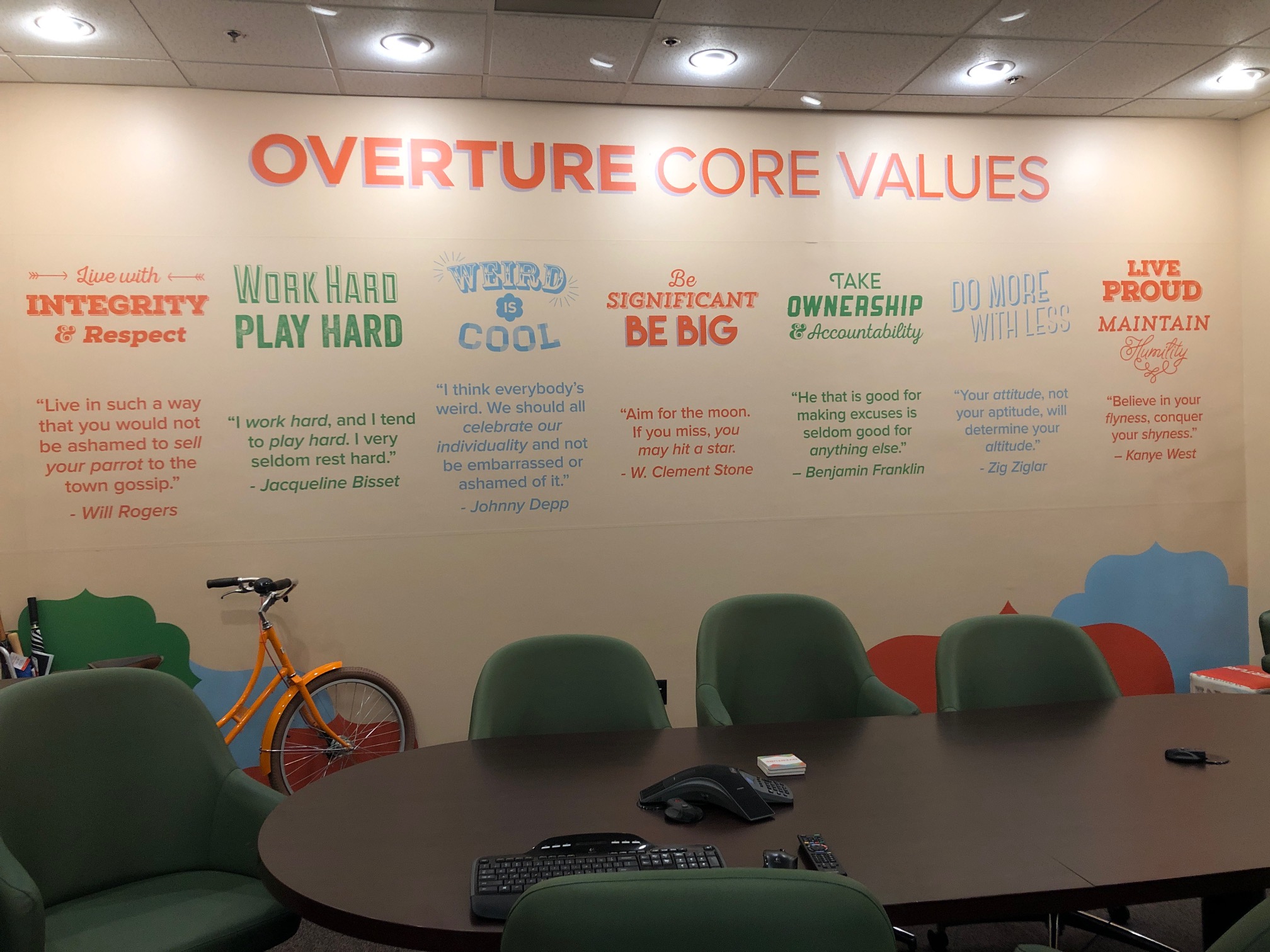Overture Promotions was founded in 2001 with a vision to create a boutique promotional marketing agency, emphasizing creative and customer service excellence. The office manager, Heather Sanderson, became the company’s first CEO. She was a gifted culture-builder, and as Overture grew, it developed a reputation as a lively, fun place to work, with a colorful office space filled with movie posters.
In 2011, Overture’s management team decided to define the company’s shared values. While most organizations would assign that task to management, we decided to build them from the ground up. We began working with a consultancy called Delivering Happiness, which grew out of a book by the same name, authored by Tony Hsieh, CEO of Zappos. Hsieh’s premise is that you define core values by asking employees what’s important to them. Overture’s management team met with the Delivering Happiness team several times to introduce them to Overture and develop the questions to ask employees. Delivering Happiness surveyed Overture employees over the course of two to three weeks. They consolidated the responses, which became Overture’s Core Values:
- Live with integrity and respect.
- Work hard, play hard.
- Do more with less.
- Weird is cool.
- Live proud, maintain humility.
- Be significant. Be big.
- Take ownership and accountability.
The next phase was to work with Delivering Happiness on bringing those Core Values to life. First, we explained in writing what each value actually means in terms of our commitments to each other and our customers, based on the input from employees. For example, this is how “Live with integrity and respect” is articulated as a way of working together.
At Overture we believe it is imperative for all of our stakeholders to adhere to the highest moral and ethical standards. While there may be situations in which choosing the path of integrity costs us short-term gains, we know that it will lead to building our company the right way with the right people. This commitment to truth and mutual respect should be displayed throughout all levels of the organization, as well as across our supplier and client partners. The Overture culture is not only about how we behave toward each other within our walls, but also how we represent ourselves in the general community every day.

We tried a couple things that failed, including a Core Value of the Month program that felt forced and didn’t really engage employees. Other ideas stuck. We added a related inspirational or funny quote for each Core Value. For example, for “Take ownership and accountability,” we used this Ben Franklin quote: “He that is good for making excuses is seldom good for anything else.” We painted the Core Values and quotes on the wall of a conference room, which is still today known as the “Core Values” room. We put them on our business cards and added them to presentations. They are given to each new employee as a flyer that can be posted on a wall or cubicle. You hear them spoken as encouragement and reminders.
The biggest learn for the management team through the Core Values project was that people want to be part of something that inspires them. If employees are inspired and happy, it shows—and it leads to happy customers.
Fast forward six years to 2017. Sanderson left Overture, and I stepped in as CEO after doing nine months of consulting for the management team. I’m an original investor in the company, with a 25-year career in marketing, mostly in the tech and internet space, and two years as vice president of marketing for the Chicago Sky WNBA team. I mention that because it was the only time in my pre-Overture career that I had any responsibility for promotional marketing. (And a mascot.) Clearly, I had some things to learn.
I learned that the promotional RFP cycle is way longer than the cycle for advertising and PR agencies. That promotional marketing is an order of magnitude more complex than other marketing disciplines, with global supply chain management as a crucial element. That what to some may look like “slapping a logo on X” is actually a creative exercise in finding the right product for the project, audience and brand, and then expressing the logo in a creative way that honors the brand standard.
As for Overture in 2017, six years after those Core Values were built? Bigger, growing and more complex, with a new ERP and WMS, and more customers with complicated and hyper-customized web stores and programs. We provide end-to-end services in-house—including embroidery and screen print, web development and graphics, fulfillment and kitting—so supply chain control is critical, as there are more opportunities for broken processes and mistakes.
What I did have going for me was experience in managing large teams, having managed offices of a global PR agency and a 150-person, globe-spanning communications team at IBM. While Overture’s culture was still lively in 2017, its Core Values still essential, there were a couple opportunities to layer in some new values that are essential for a growing company.
The first one: “Solve problems.” Simple, right? But when a company is growing and everyone is moving fast, it’s easy to default to pointing fingers when there’s a mistake—followed by the scramble to fix and move on, rinse and repeat, without ever taking time to dig into why the mistake happened. So, we changed our approach:
- First priority: Make the problem right.
- Create a case in the ERP, so that everyone who needs to know about the problem, does.
- Walk through the process the problem emerged from and find what’s broken. It might be that we need an extra field on an order form, or that someone in the distribution center doesn’t have a way to get the information he or she needs.
- Fix the process, or the distribution and availability of information. Make mistakes harder to make.
- Document the fix and communicate to staff.
The second one: “Communicate and collaborate.” When you’re busy, moving fast and growing, meetings can seem like a waste of time—the thing to cross off or skip. But, sometimes, a quick meeting or a regular meeting can be the most efficient way to solve problems, explain new processes, ensure everyone has the information they need, brainstorm and—most importantly—connect. As Steve Jobs said: “Great things in business are never done by one person. They’re done by a team of people.”
Overture’s leadership team meets together weekly. We meet with our sales leaders once a month, a meeting that has evolved from company updates to sharing ideas and best practices, and solving shared problems. The sales assistants meet monthly for training, sharing ideas and problem solving. They also do regular Stop/Start/Continue sessions with Overture’s HR manager, allowing them to discuss what’s been working, what hasn’t and what they want to try. We encourage regular team meetings in each department, and I do monthly check-ins with the operations and finance teams, where we look ahead and identify big-picture priorities.
“Solve problems” and “Communicate and collaborate” made their way onto the list of Overture’s Core Values in late 2018. There’s one more we’re working on: “Keep learning.” Our management team and sales leadership are going through a customized management training course, with second-line managers scheduled for 2020. We created Overture’s Sales Academy as a way for our experienced sales leaders and management to share their knowledge and experience with our younger sales reps.
We remain firm in our shared belief that the work we get to do every day should be fun. “Work hard, play hard” is a mantra at Overture. Our volunteer Culture Crew creates ways for us to play together, including a new, year-long Harry Potter-esque House Cup competition, with every employee on a team and earning points for participating in everything from community service projects to chili cook-offs to meme-a-thons. (I’m in favor of adding “nap hard” to this value, but it’s not getting any traction.)
Clearly, companies grow and evolve. Culture and values have to evolve with them. Our first Core Values were about who we are at work. Our new ones are more about how we work together. Stay tuned for what’s next in our evolution.



